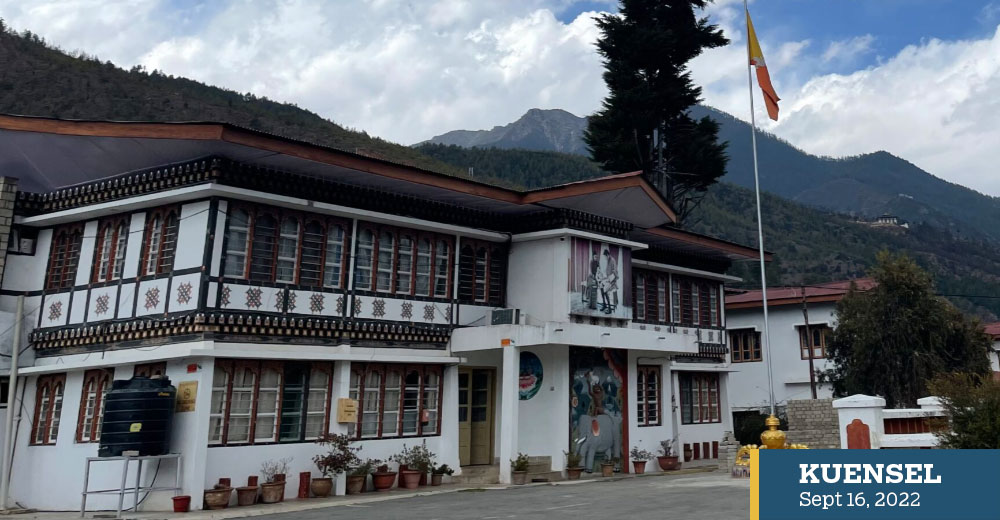School authorities say no budget to print textbooks
Rinzin Wangchuk
Four printing firms, including Kuensel, are in dilemma whether or not to print school textbooks for the next academic session after they won the printing jobs the education ministry tendered out.
While the printers are waiting for the final orders to start printing, many schools have not confirmed the number of textbooks they require citing lack of budget.
In June this year, the education ministry floated a quotation for printing and supply of school textbooks, more than 300 titles for the upcoming academic year, 2023. Of the four printing houses who participated, KMT printing press quoted more than Nu 68.22M, followed by Thinley Pelbar printers and publishers Nu 60M. Tshangpa printing press quoted Nu 55M and Kuensel printing quoted Nu 48.77M.
The rates were submitted based on projected quantity. The ministry then evaluated the rates and awarded the titles to the lowest bidders.
Thinley Pelbar won the maximum job (titles of textbooks), 125 titles, worth more than Nu 17M followed by KMT with 66 titles for Nu 11.509M. Kuensel got 58 titles worth Nu 8M and Tshangpa won 65 titles amounting to about Nu 3M.
However, the printing firms were disappointed to see the mismatch in printing orders and requirements from the schools. Thinley Pelbar, for instance, received a requisition worth about Nu 8M only as of yesterday. KMT and Kuensel received orders of Nu 5.7M and Nu 3.3M respectively.
The schools decided the final quantity to be printed based on budget availability. Printing firms are waiting even if the last date of submission of orders expired because printing the reduced amount would be not commercially viable.
This is because before the submission of rates, printing firms were told that the projected quantity of textbooks could increase or decrease only by 15 percent to 20 percent depending on the requisition the respective school submits. “However, the actual orders we received are far less than what we were awarded initially,” one bidder said.
Dzongkhags like Sarpang, Pemagatshel and Samdrupjongkhar Thromde have no budget to place their orders, according to printers.
Another printer said that if he prints based on the order placed by schools, he might not even cover the cost of transportation and delivery of textbooks to respective schools. “We quoted our rates based on the estimated volume. At the current order, it will be a huge loss,” he told Kuensel.
Some said that even if they decide to print textbooks, they cannot deliver to the respective schools. “How can we go and deliver just a handful of textbooks to schools in Lingzhi, Merak and Sakteng,” one private printer said. “It will be a loss.”
Teaching and learning materials provided to schools are broadly categorised into REC publications, local publications and outside publications based on the publishing rights.
Some schools blame the austerity measures for not having enough budget to procure textbooks. However, parents feel that the austerity measures should not affect students’ learning. “Every student should have one textbook each,” one concerned parent said. “It is necessary to have an independent textbook either in pre-primary or in higher grades.”
“In one Thimphu school, three students share one textbook, which makes preparation for exams inconvenient and difficult,” a parent said. “This has a direct impact on learning.”
Some also pointed out that when the education ministry can allot enough budget for seminars, workshops and meetings why can’t they invest in printing textbooks. “How can students not have enough textbooks,” she said.
The government has allocated Nu 13.316 billion in 2022-2023, constituting 16.3 percent of the total allocation to the education sector. Of the total, Nu 332.500M is for initiating education reform to equip students with the competency required in the 21st century.
Education ministry’s director general, Karma Galey said that since the budgets are released to the dzongkhags, they are currently coordinating with them to find out how much fund they have received.
Some parents are also questioning how the budget is spent. The former government spent more than Nu 3.5B to establish new central schools with full boarding facilities and freebies like toothpastes and school uniforms provided.
The present government spent about Nu 700M in providing scholarships for Class XI students to study in private schools. “When government can afford scholarships, which actually should be the responsibility of the parents, why not the government provide adequate textbooks,” she questioned. “Students or parents in remote schools will not be able to afford even if they want to buy. They will be the worst affected.”
As of 2021, the country has 168,324 students in 605 schools including 36 private schools.


